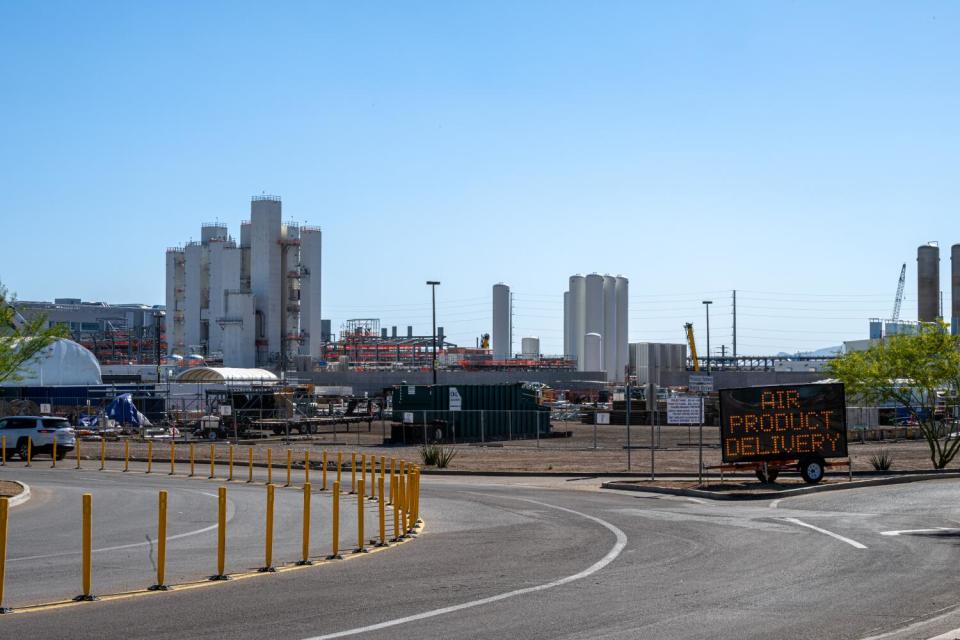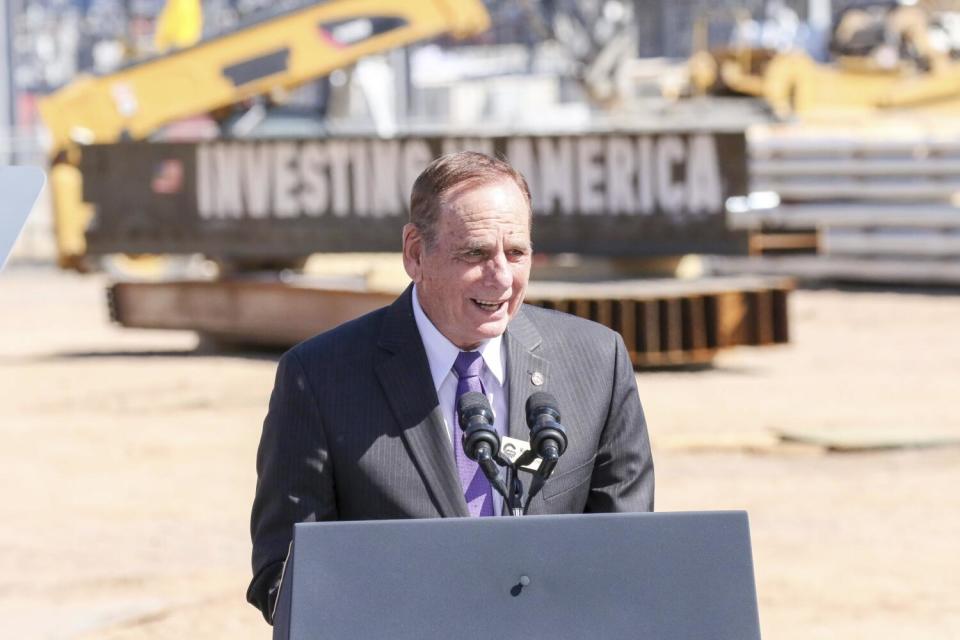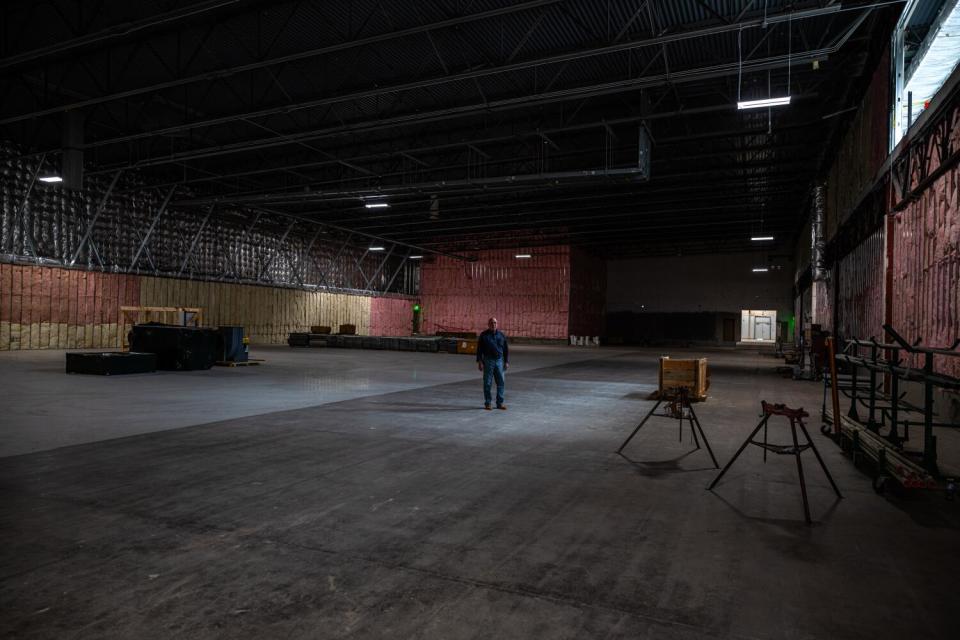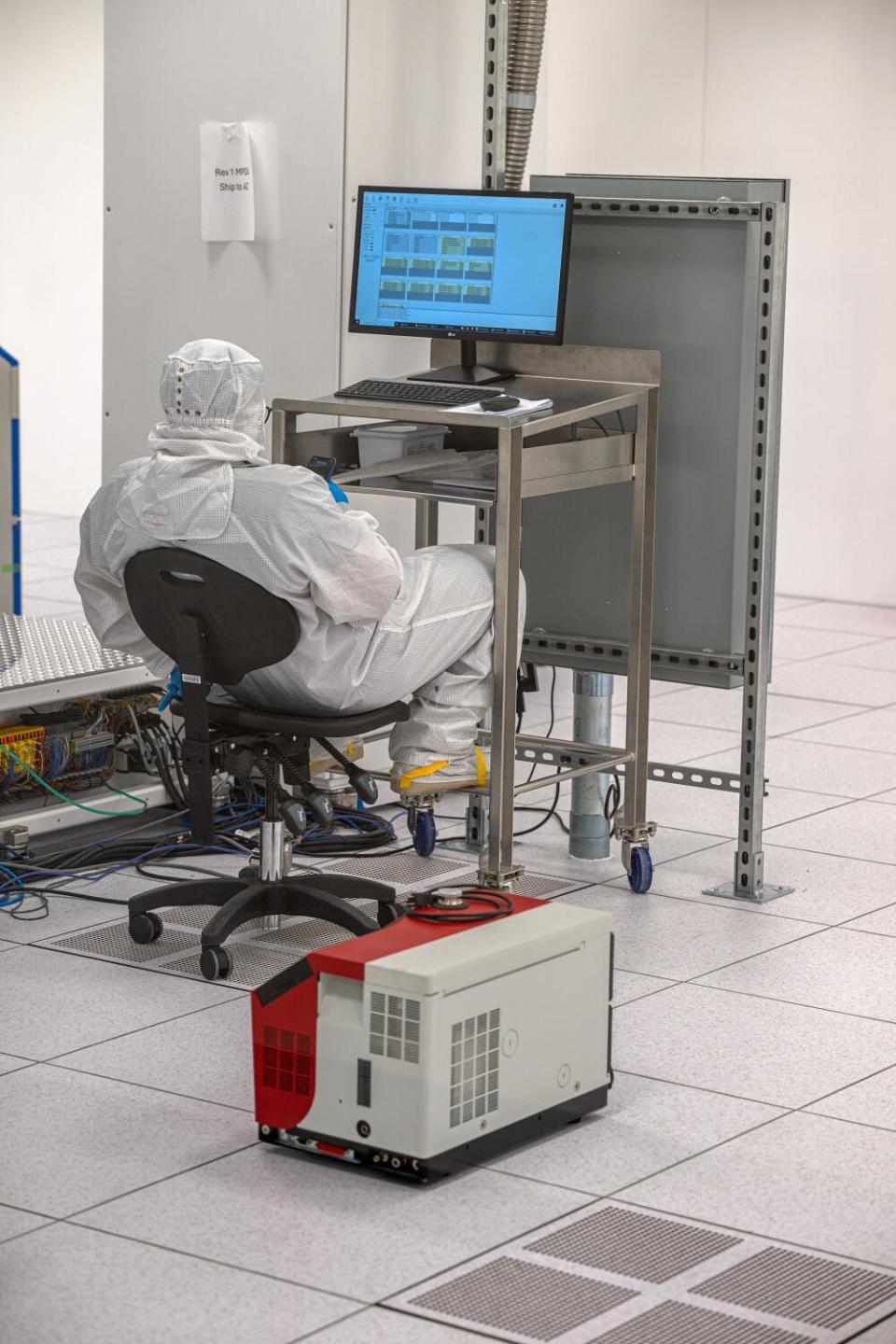Aaron McDonald thinks back to when he came to Maricopa County nearly 20 years ago as a young ironworker hoping to get work building a new football stadium.
Driving in from Wyoming for the first time, he was struck by the overwhelming desert expanse that surrounded Phoenix.
Today, those sweeping vistas are dotted with industrial development that is transforming Arizona’s economy. A region that was devastated by the 2008 financial crisis is teeming with massive projects under construction, fueled in part by President Biden’s signature legislative accomplishments aimed at rebooting American semiconductor production.
“There was a shooting range there. It was the Wild West and now there’s a giant chip factory out there,” said McDonald, who now trains union ironworkers, referring to an enormous complex of plants being built in northern Phoenix by TSMC, the Taiwan Semiconductor Manufacturing Co. “The growth, to me, just really doesn’t seem like it’s gonna slow down at anytime. We know we have Biden to thank for this work.”
The question for Biden’s reelection team is whether enough voters in this battleground state will feel the same way in November.
His administration has awarded billions of dollars to companies such as Intel and TSMC and hopes that the enormous investments in green technology and semiconductors can make a difference in a state where Biden bested President Trump by a mere 10,000 votes in 2020.
Read more: Arizona and Nevada make up 3% of the U.S. population — and are vital to picking a president
But recent polling points to the challenges in winning over those voters.
The Inflation Reduction Act, the Bipartisan Infrastructure Law, and the CHIPS and Science Act will ultimately send about $24 billion to Arizona, according to data compiled by the White House.
But a majority of Americans recently surveyed nationally said they didn’t know enough to say whether the Inflation Reduction Act helped or hurt them in the two years since its passage, according to recent polling from the Associated Press-NORC Center for Public Affairs Research. And a majority of registered voters in Arizona thought Trump was “more trusted” than Biden to address the economy and immigration, a recent Bloomberg/Morning Consult poll found.

TSMC has committed to spending $65 billion in the state building facilities in the next decade, on top of the roughly $11 billion in loans and grants it recently received from the U.S. Department of Commerce. The company has said its new facilities, when completed, will create 6,000 permanent and roughly 20,000 temporary jobs.
“When you drive to the north, or you drive to the south, you see what my wife calls the cranes of prosperity. And they are very prominent,” said Zachary Holman, an engineering professor at Arizona State University.
Intel is similarly expanding its footprint in Arizona, where it had been pulling back its presence as recently as a decade ago. It received about $10 billion from the Commerce Department, adding to the nearly $20 billion it plans to spend to expand its presence.
But with many of the new jobs arriving years in the future, more immediate concerns such as soaring rents, rising consumer prices and the crisis at the Arizona-Mexico border are capturing most of the attention.
Trump and his allies hope things stay that way, even as they wrestle with voter anger over the state Supreme Court decision banning virtually all abortions. The Legislature voted to undo the law with some Republican support.
“Arizona voters are ready to turn out for President Donald J. Trump this November,” said Rachel Lee, a spokesperson for the Republican National Committee. “Joe Biden is losing in the state, and he knows it. Despite Biden’s best attempts to gaslight voters, they know exactly who is to blame for soaring costs, a spiraling border crisis, and staggering crime rates across the country.”

Kevin Hartke, the Republican mayor of nearby Chandler, said the investment in his city has been a godsend, while noting that it has been a bipartisan boost across multiple administrations — making it hard for Biden to own this growth exclusively.
“Your common person here is going to complain more about the cost of gasoline, the effect of inflation and certainly the housing crisis,” Hartke said. “I think those areas where there is more of ‘this hits me’ concerns as people struggle to keep up with those kind of growing prices.”
In addition to expanding semiconductor production, the money has gone toward renovating Phoenix’s airport, expanding the 10 Freeway through the region and planting more trees in the city.
“The last four years have been transformational for Phoenix,” said Mayor Kate Gallego, a Democrat. “We are going to have a more diverse high-wage economy for a generation because of Biden. My job is to help people appreciate the change we’re going through and how it means that they will have more opportunities to stay here.”
This showering of money didn’t seem to register for Gabi Zander, 34, who was at a recent farmers market with her mother in Phoenix’s Uptown neighborhood. Zander, who has lived in the area for more than a decade and works in marketing, said she is focused on the rising cost of living and the war in Gaza.
The recent ruling banning virtually all abortions in the state, since overturned, angered her. But the larger state of politics has her down and she’s unsure she’ll even vote.
“I just wish politicians would spend more time thinking about how to make the city more livable and get more funding for teachers,” Zander said. “I wish they would leave us alone.”
An Emerson College poll showed Biden trailing Trump in Arizona 44% to 40%, with Robert F. Kennedy Jr. at 9%. A more recent poll from Data Orbital, a Phoenix analytics and survey firm, found Biden and Trump at 38% with Kennedy at 14%.

The Biden campaign has identified some combination of Arizona, Pennsylvania, Nevada, Michigan, Wisconsin and Georgia as essential to the president’s reelection.
In 2020, Biden became the first Democrat to win in Arizona since President Clinton in 1996. The last Democrat to prevail here before that was President Truman in 1948.
The state has been a player in semiconductors for decades, with Intel’s presence dating back nearly 40 years.
Companies say they are able to produce these chips far more cheaply in places like Taiwan, South Korea and Japan, but the COVID-19 pandemic and emerging tensions with China have led government and private-sector officials to revive domestic production. This was the impetus for the $52-billion CHIPS and Science Act, which Biden signed in the summer of 2022. (CHIPS stands for Creating Helpful Incentives to Produce Semiconductors.)
Much of the money — $39 billion — will come in the form of grants and tax breaks to Intel and other companies. The other $13 billion will go to research and training.
Arizona was a natural destination thanks to its open spaces and affordable land, favorable business climate and the fact that many of these companies already had a presence in the region. Intel and TSMC had already committed billions to construct new manufacturing facilities before they received government grants and tax breaks in the last year.
“Some of these companies were starting to move” to the region, said Eelco Bergman, the chief business officer of Saras Micro Devices. “I think where things like the CHIPS Act helped is they took that spark and threw some kindling on the flame.”

Bergman and his partners have relocated their manufacturing facility to be close to Intel’s facility in Chandler. Saras is spending close to $200 million on upgrading a building and purchasing the equipment to produce components that can be sold to semiconductor manufacturers, Bergman said.
The business ecosystem is thriving, he added, because of heavy investment and being in close proximity to schools like Arizona State University, which graduates 7,000 engineering students a year. Intel hires more people from ASU than any other school in the country, and there’s a shortage of people skilled in the disciplines necessary to work in these industries, according to the company.
Read more: Why Biden is getting little credit for the economy, especially in California
However the politics ultimately play out, the region has seen a monumental shift from an economy based in real estate and tourism into one heavily layered with future-facing manufacturing. Some of the investment predated Biden, but it was supercharged during his term.
“No one is getting total credit for the big picture of the success story … because it’s happened over such a long period of time,” said Rep. Greg Stanton, a Democrat and former Phoenix mayor. “The more interesting political question is, in the short run who gets credit for the United States finally having an industrial policy that’s been missing for such a long period of time where we finally respond to the challenge that is China?
“I think President Biden is going to get appropriate credit for that. Arizona has and will better benefit from the CHIPS and Science Act than any other state,” Stanton said.
Ironworkers like those McDonald is training are bouncing from job site to job site, watching outsize warehouses and manufacturing sites rise from the desert. The work is dangerous and can be chaotic, but it’s creating a future for people like Shawna Irwin, 25, who is originally from the Navajo reservation in northeastern Arizona.
Her late uncle — an ironworker — inspired her to enter the field. She later enrolled in a training program sponsored by the Ironworkers Local 75 and run by McDonald. The roughly four-year program — sometimes called the University of Iron — has ballooned to nearly 250 ironworkers who get supplemental training as they continue to work on job sites. McDonald would like to be training 500 ironworkers at the facility he manages by 2026.
“It opened a lot of doors for the unions,” Irwin said, “and for us there was a lot more work because of [Biden] funding the chip plants.”
This story originally appeared in Los Angeles Times.
Signup bonus from




